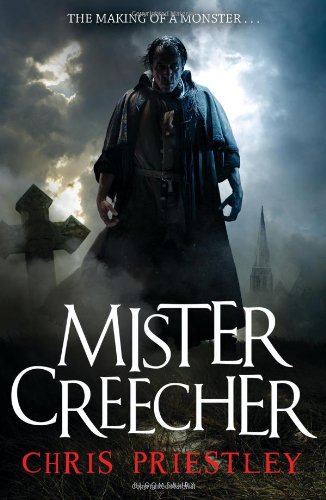
Mister Creecher
Chris Priestley
London, Bloomsbury, 2011, 384p
I'm a little uncertain of meta fiction, especially if I'm a fan of the original. But I do love the Gothic, and love taking a trip down memory lane, reminding me of my A-level days studying Dracula and Frankenstein.
It's the start of the nineteenth century and life is not easy for young Billy. He is a street boy, a petty thief, when he meets Mister Creecher. This mysterious, terrifying giant helps Billy out of a sticky situation, and each become embroiled in their new friends life. Creecher is Frankenstein's famous creation - this novel tells of the time Frankenstein spends in England working on a mate for his "monster". Creecher asks Billy for help: he supports Billy in his thievery, and Billy follows around Frankenstein to ensure that the creation can keep tabs on the scientists progress.
The two companions begin their journey in London, haunting the streets of the city. Billy's life is greatly improved by his new friend: he is well fed, properly clothed and lives in warm accommodation for the first time in his life. And yet, he knows very little about Creecher and his peculiar qualms with the mysterious scientist.
This is a brilliant Gothic tale - dark, gorey and tragic. Priestley is brilliant at this, as I found when I read his Tales of Terror, which caused many a sleepless night. He draws on some traditional tropes, dating back to the original story of Frankenstein by Mary Shelley; but he adds some modern twists and more accessible language for his young contemporary audience.
Part of my love for the original Frankenstein novel comes from Mary Shelley's exploration of the concept of the noble savage: is the creation moulded most by nature or nurture? In the 1818 novel, the creation is given the chance to tell his own story, explaining how his initial innocence was corrupted by the judgements and unkindness of mankind. In Mister Creecher, Priestley expands on this concept, taking the reader on a journey that allows us to understand how his anger and aggression grows through constant rejection and lack of love.
In this story, Creecher's relationship with Billy seems like an opportunity for redemption, but we all know where the story ends. Well, I assume many readers do, but of course it is not guaranteed that Priestley's audience would have read Shelley's original. I found myself musing on what a young reader might think of Mister Creecher without the contextual knowledge of the original story, the Romantics Movement and early nineteenth century London. Luckily, this novel is being read as part of my school book club, and I cannot wait to hear what my students think!
No comments:
Post a Comment